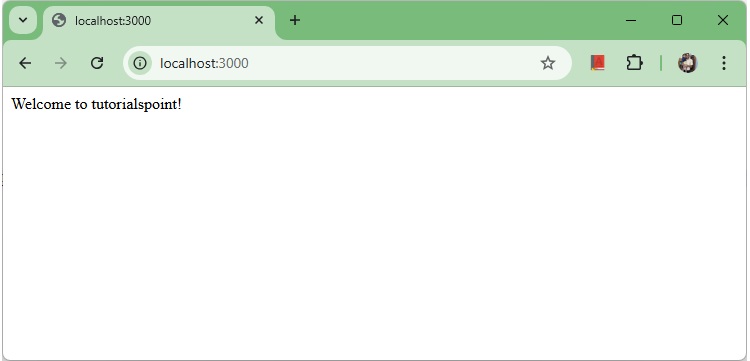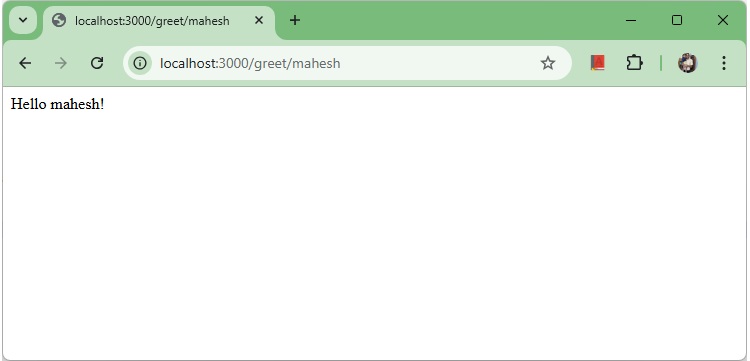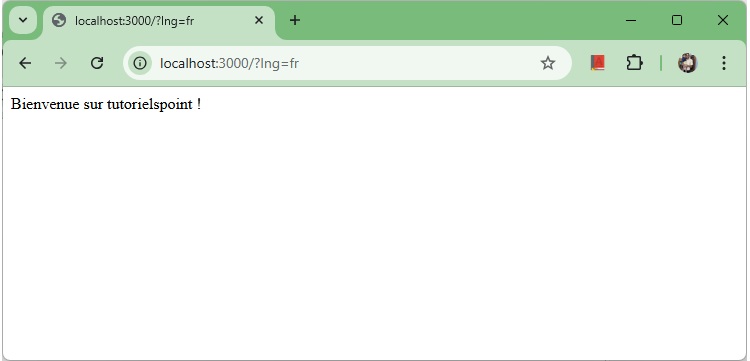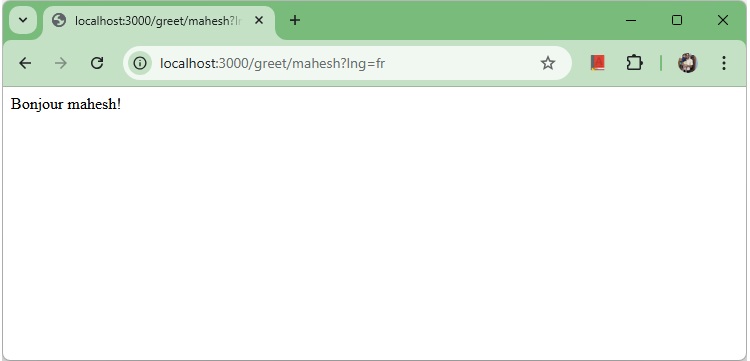- ExpressJS - Home
- ExpressJS - Overview
- ExpressJS - Environment
- ExpressJS - Installation
- ExpressJS - Hello World
- ExpressJS - Routing
- ExpressJS - HTTP Methods
- ExpressJS - URL Building
- ExpressJS - Middleware
- ExpressJS - Templating
- ExpressJS - Static Files
- ExpressJS - Form Data
- ExpressJS - Database
- ExpressJS - Cookies
- ExpressJS - Sessions
- ExpressJS - Authentication
- ExpressJS - RESTful APIs
- ExpressJS - Scaffolding
- ExpressJS - Serving Dynamic Content
- ExpressJS - Handling File Uploads
- ExpressJS - Internationalization(i18n)
- ExpressJS - Security Practices
- ExpressJS - Rate Limiting
- ExpressJS - Slowing Down Responses
- ExpressJS - Error handling
- ExpressJS - Debugging
- ExpressJS - Best Practices
- ExpressJS - Resources
ExpressJS - Internationalization
Internationalization or I18N refers to the ability of an Application to serve users in multiple and different languages. We can implement internationalization in express js easily using following modules−
i18next− core framework for Internationalization.
i18next-express-middleware− middleware to detect user language and provide i18n functionality to express routes and requests.
i18next-node-fs-backend− backend to load messages from file system.
Installing i18n modules
We can use the following command to install above i18n modules using npm.
npm install --save i18next i18next-http-middleware i18next-fs-backend
Creating Translation files
Let's us create two translation files, one for default local english and one for french. We'll store a sample message as Hello! in both languages.
Folder Structure
locales
en
translation.json
fr
translation.json
en - translation.json
{
"welcome": "Welcome to tutorialspoint!",
"greeting": "Hello {{name}}!"
}
fr - translation.json
{
"welcome": "Bienvenue sur tutorielspoint!",
"greeting": "Bonjour {{name}}!"
}
Initialize i18n and use
const i18next = require('i18next');
const Backend = require('i18next-fs-backend');
const middleware = require('i18next-http-middleware');
i18next
.use(Backend)
.use(middleware.LanguageDetector)
.init({
fallbackLng: 'en', // Default language
backend: {
loadPath: './locales/{{lng}}/translation.json'
},
detection: {
// Order and types of detection
order: ['querystring', 'cookie', 'header'],
lookupQuerystring: 'lng',
lookupCookie: 'i18next',
caches: ['cookie']
},
interpolation: {
escapeValue: false // React already handles escaping
}
});
app.use(middleware.handle(i18next));
Explanation
use(Backend)− use i18next-fs-backend as backend to read translatio files from file system.
use(middleware.LanguageDetector)− allows application to decide language based on Accept-Language header sent by consumer.
fallbackLng− default language as english if no translation found for a key.
loadPath− load translation files from relevant language folder identified by {{lng}} attribute.
app.use(i18nextMiddleware.handle(i18next))− directs express to use i18next middleware.
t function
i18next-express-middleware provides express request a translation function t. t function looks for the key in the messages loaded by i18n and returns the corresponding language translation.
Define express routes and use t function
app.get('/', (req, res) => {
res.status(200);
res.send(req.t('welcome')); // Uses the appropriate translation
});
app.get('/greet/:name', (req, res) => {
res.status(200);
res.send(req.t('greeting', { name: req.params.name }));
});
app.listen(3000);
Example Usage
English− http://localhost:3000/
French− http://localhost:3000/?lng=fr
Complete Example - Internationalization
Following is the complete code of index.js
index.js
var express = require('express');
const i18next = require('i18next');
const Backend = require('i18next-fs-backend');
const middleware = require('i18next-http-middleware');
var app = express();
i18next
.use(Backend)
.use(middleware.LanguageDetector)
.init({
fallbackLng: 'en', // Default language
backend: {
loadPath: './locales/{{lng}}/translation.json'
},
detection: {
// Order and types of detection
order: ['querystring', 'cookie', 'header'],
lookupQuerystring: 'lng',
lookupCookie: 'i18next',
caches: ['cookie']
},
interpolation: {
escapeValue: false // React already handles escaping
}
});
app.use(middleware.handle(i18next));
app.get('/', (req, res) => {
res.status(200);
res.send(req.t('welcome')); // Uses the appropriate translation
});
app.get('/greet/:name', (req, res) => {
res.status(200);
res.send(req.t('greeting', { name: req.params.name }));
});
app.listen(3000);
Output
In browser, open http://localhost:3000/ to use english based translation file.

http://localhost:3000/greet/mahesh

In browser, open http://localhost:3000/?lng=fr to use french based translation file.

http://localhost:3000/greet/mahesh?lng=fr

